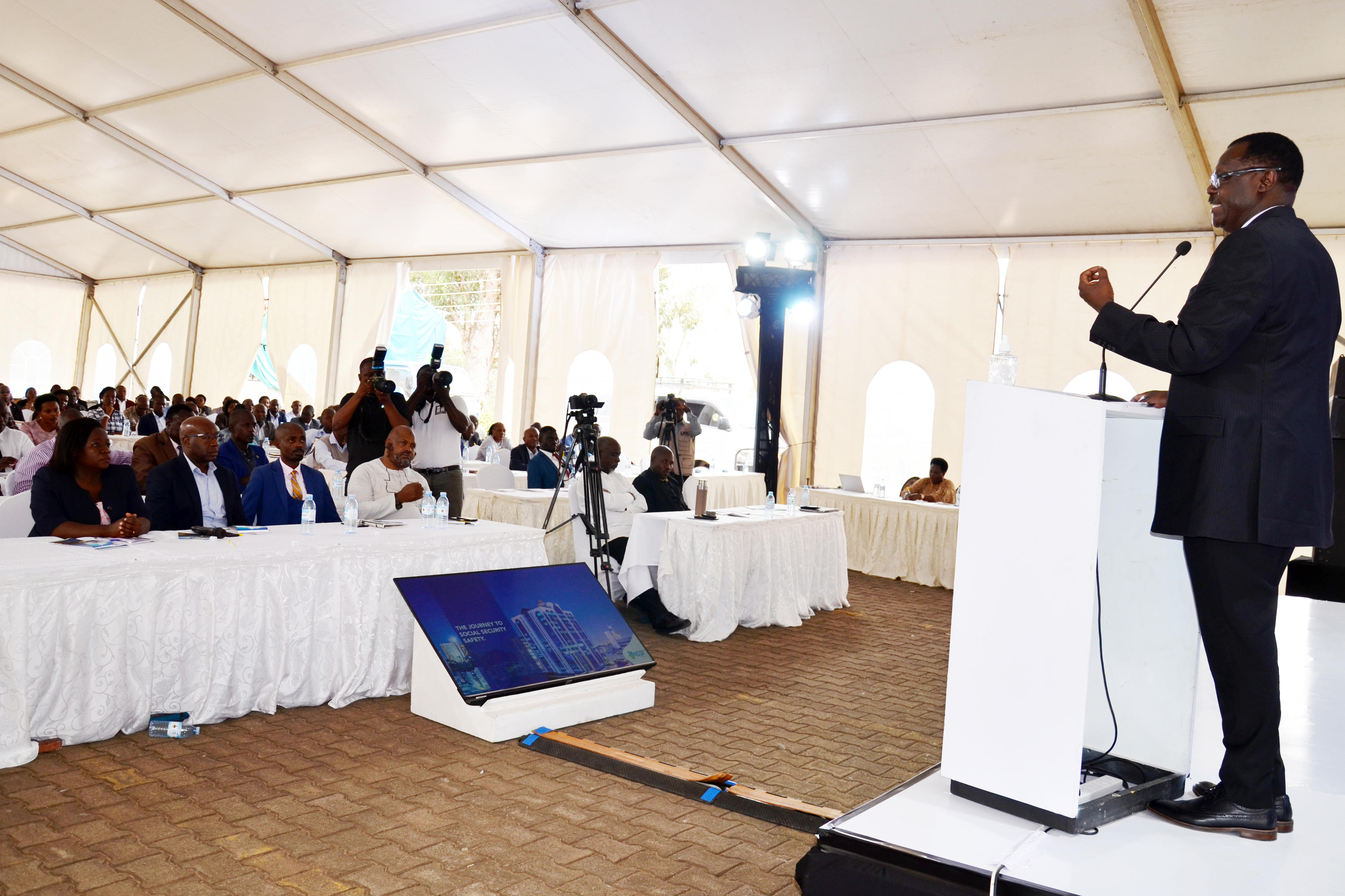NSSF urges labour officers to report non-compliant employers

Mr Patrick Michael Ayota, the NSSF Managing Director speaks to workers at Lake View Mbarara City on August 26. PHOTO/JULIUS BYAMUKAMA
What you need to know:
- The Fund manages assets worth over UGX 18 trillion, invested in Fixed Income, Equities and Real Estate assets within the East Africa region. As the largest Fund in East Africa by value, we have the ambitious goal of growing our Assets Under Management to 20 trillion by 2025.
Labour officers from western districts, municipalities and cities have been asked to report employers and workers who are not compliant to the National Social Security Fund (NSSF).
Speaking at Lake View Resort Hotel in Mbarara City to over 300 Government labour inspectors from 35 districts in Western Uganda on August 26, the Minister of Gender Labour and Social Development, Ms Betty Amongi said employer compliance with the NSSF Act has become a key area of emphasis.
She asked labour inspectors assist in bringing more workers on board. The Gender Minister said leveraging the network of labour inspectors across the country on NSSF Compliance will improve registration with NSSF.
“Prior to the passing of the NSSF Act, as amended, the Fund’s coverage was only 10%. The Act has opened the spectrum of social security where every worker can now save either through their employer or voluntarily. But how will NSSF know where they are, whether and how much they are being paid? Our Labour Inspectors have boots on the ground and will be the eyes and ears of these workers who have never been registered by NSSF”, said Ms Among.
Minister Amongi highlighted that Labour Inspectors will carry out inspections on the spot to find out which employers are not complying with the NSSF Act and support the Fund to map out the landscape of workers in Uganda and share this information with NSSF.
“When Government undertook a retrenchment exercise, I commissioned a consultant to find out how those that were retrenched were coping. The study found out that within 5 years of those who were at the rank of Commissioner, 20% had passed away within just five years because they were not prepared for that loss of income. So, it is both the responsibility of the individual worker as well as the government to ensure that all Ugandans have social protection,” she said.
Mr Patrick Michael Ayota, the NSSF Managing Director said that the partnership has been born out of a standard shift in thinking at the Fund.
“We have a two-pronged strategy - first is to increase willingness to save by ensuring all eligible businesses understand and comply with the NSSF Amendment Act. This is the first objective of the partnership with the Ministry of Gender, Labour, and Social Development, where the Labour Inspectors shall support the Fund to ensure employer compliance in their districts,” he said.
Mr Ayota added that the second part of the strategy is to increase NSSF capacity to save for every Ugandan who earns an income stating that they will do it through strategic partnerships and highly innovative business models to make entrepreneurship, saving and investing.
Section 9 of the Employment Act 2006 provides for the appointment of at least one Labour Officer by each District for purposes of administering the Act. Section 11 of the same Act empowers Labour Officers to visit any workplace freely for inspection, including carrying out examinations or inquiries necessary for ensuring compliance with legal provisions.
The NSSF Act, as amended, now requires every employer, irrespective of the number of workers they employ, to pay social security contributions for all their employees.
About NSSF
The National Social Security Fund Uganda is a multi-trillion fund mandated by the government through the NSSF (Amendment) Act, 2022 , to provide social security services to all eligible employees in Uganda.
The Fund manages assets worth over UGX 18 trillion, invested in Fixed Income, Equities and Real Estate assets within the East Africa region.
The Fund is regulated by the Uganda Retirement Benefits Regulatory Authority while the Minister of Gender, Labour and Social Development, and the Minister of Finance, Planning and Economic Development are responsible for policy oversight.



